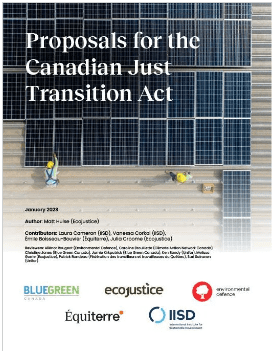Waiting six years for federal methane regulations means thousands of lost jobs for Alberta and 55 million extra tonnes of emissions, says new report
For Immediate Release
July 5, 2017, Calgary, Alberta—A new methane industry report shows Alberta is far better off putting in place its own stronger provincial methane emissions regulations and adopting them right away rather than waiting until 2023 for the federal government’s draft methane regulations to come into effect.
The report shows Alberta is set to gain good, high paying jobs in methane reduction—a relatively easy way to cut emissions— that include work in engineering, manufacturing, surveying and administration. Industry leaders say the methane emissions reduction industry, with 104 of the 174 companies based in Alberta, is set to grow by 80 per cent within the next few years.
“Although we built our methane reduction technology in Alberta, we’re using it in the United States, and creating good jobs where there are state methane regulations,” says Terence Trefiak, president of Target Emission Services. “With strong Alberta methane regs we could see that same growth in our home province.”
Trefiak adds there is a good business case for facility owners and leak detection contractors to go after the tens of thousands of unchecked methane leaks, but without effective provincial regulations, companies will not voluntarily implement effective programs.
The report shows the potential to create jobs in a growing methane mitigation industry—up to 15,000 years of work over a decade, or 1,500 jobs each year —could be delayed or lost to U.S.-based competitors that have already begun developing new equipment and approaches in leading U.S. markets, where methane regulations are already firmly in place.
The report shows that delaying implementation of the federal methane regulations to 2023 also means the oil and gas sector will release an additional 55 million tonnes of carbon emissions, something Alberta could help reduce by adopting its own stronger regulations.
“By acting now to implement a regulatory system that strengthens the draft federal regulations —using them as a floor and not a ceiling —Alberta can once again lead the country’s methane reduction efforts, while cutting unnecessary emissions,” said Jamie Kirkpatrick, program manager of the Blue Green Canada, the report’s author.
The Alberta government released its Climate Leadership Plan in November 2015, which committed the province, in collaboration with industry, environmental organizations, and First Nations, to implement a methane reduction strategy to reduce emissions by 45 per cent from 2014 levels by 2025. The government is expected to release its draft regulations this Fall.
"Alberta used to lead in methane management in the oil and gas industry, but failed to keep regulations in line with advancements in technologies. Now Alberta has the opportunity to step up to the challenge and demonstrate leadership again,” said Andrew Read, a senior analyst at the Pembina Institute. “Alberta is poised to take advantage of the Alberta-based commercially available innovations that can help rein in this troublesome greenhouse gas."
He added that since Alberta has chosen to exclude the oil and gas industry from the carbon levy until 2023, strong regulatory requirements for methane management will be needed to achieve any reductions from the sector. With this advantage provided, there’s no reason for industry to delay deployment of methane abatement technologies.
-30-
For more information, please contact:
Jamie Kirkpatrick, Program Manager – Blue Green Canada, Cell: 416-895-3406, jkirkpatrick@bluegreencanada.ca
Terence Trefiak, President – Target Emission Services, Cell: 713-377-3135, trefiak@targetemission.com
Andrew Read, Senior Analyst – Pembina Institute, Cell: 780-729-9023, andrewr@pembina.org
BLUE GREEN CANADA is an alliance between Canadian labour unions, environmental and civil society organizations to advocate for working people and the environment by promoting solutions to environmental issues that have positive employment and economic impacts.


